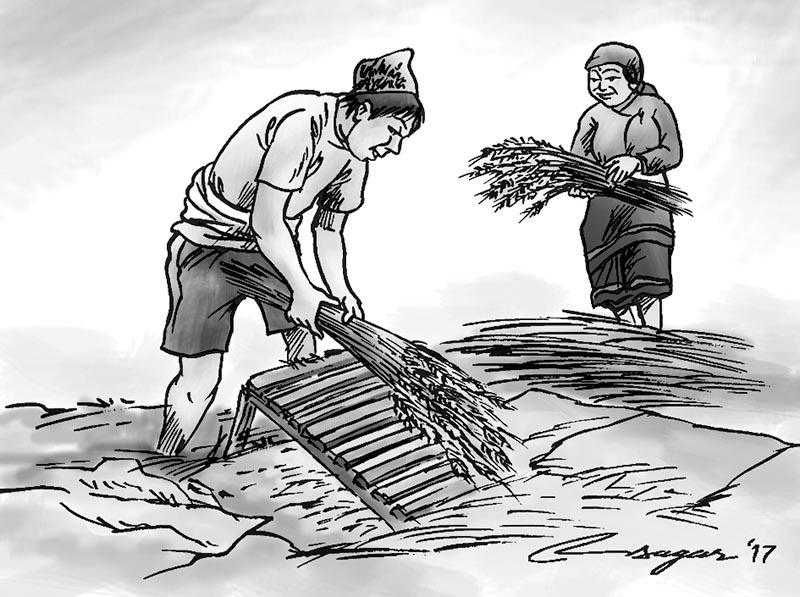Sustainable value chain: Large potential
Lack of coordination among the actors of value chain at different level has caused loss and degradation of agro products. As a result, farmers get a very low price for their products and consumers pay a large sum for the same
Although it can be crucial, development of agriculture alone can never upgrade the overall economic status of a country. To evolve economically, it is imperative for the country to embrace an industrial and service oriented economy by developing labour productivity in agriculture and diverting excess farm labour into other sectors. However, uplifting labor productivity to this level with scattered small farms and a lean technological diffusion among farmers is virtually impossible.
Nepal, an agricultural country with 13.8 million small holder farmers working in an average farm size of 1.4 ha, is still struggling with such small scale scattered farming that has been a major bottleneck in the development of agriculture and in turn the whole economy. To uplift this small scale agriculture to a higher echelon improved farm practices alone cannot play a sufficient role. Among several others, sustainable value chain is one of the key options to boost agriculture to a larger scale.
A sustainable value chain is an economically viable, socially just and environmentally friendly way of production, and addition of value to the product until it makes it to the consumer. It can play a vital role in easing provision of inputs and increasing farmer’s income that can motivate and support them to enlarge the production scale. Not only producers, it can also aid in benefiting consumers by providing value added qualitative and nutritious food. With dramatic urbanization and income rise on the way, the dietary demand of Nepalese is gradually shifting from staple crops to highly diverse nutritious foods.
By adding or preserving nutrient of agro products and also by easing the reach of diverse nutrient rich product to consumers, sustainable value chain can fulfill this demand extensively. In addition, sustainable value chain can also provide decent jobs to multitudes of stakeholders who take part in adding value to product at different stages after production.
Though a sustainable value chain bears such a large potential, in Nepal, factors as informality of small holders, limited outreach of formal financial institutions, high transaction cost, lower growth of infrastructure, lack of coordination among the actors of value chain, lack of credit facilities and highly scattered farms are creating major hurdles to develop an enabling environment for it. As a result, Nepalese farmers see much difficulty in production and distribution of their products. Among the existing ones, very few value chains are efficient and render smooth flow of quality input materials to farmers and agro product to consumers.
To address these problems and establish a well coordinated, broad and efficient value chain government of Nepal has promulgated various policies. In 2009 Government of Nepal promulgated commerce policy 2065 to broaden value chain by promoting export of agro products. Similarly, in 2006 government promulgated agriculture promotion policy to catalyze private sector participation in the improvement of agriculture value chain. However, lack of responsible public institutions and organizations has made effective implementation of these policies highly questionable. Consequently, Nepalese agriculture is facing several drawbacks in various steps of value chain - procurement of input materials, production, aggregation, processing and distribution.
To come up with solutions, the government should firstly devise an efficient way to consolidate farmers land. Such initiative can help in easing every step of food value chain. It becomes easy to get inputs and credit facilities for farmers when massive plantations are located at a place. Similarly, aggregation of produced goods can be done easily and with a low cost. As rapid consolidation of land is unlikely in the present context of Nepal, government should focus its policies on gradual consolidation over generations. Provision of ICT tools can be next way towards sustainable value chain. Rural farmers, through ICT tools can get information on environmentally safe production practices, market prices, availability of inputs and market conditions while, wholesalers and processing industries can have an easy access to the farmers both of which can substantially aid in smoothening value chains.
Lack of coordination among the actors of value chain at different level has caused loss and degradation of agro products. As a result, farmers get a very low price for their products and consumers pay a large sum for the same. Furthermore, a feebly regulated value chain has resulted in several fraudulent activities within it. With regard to this, good regulation and coordination within value chain have become mandatory aspects of it.
Finally, food value chain is the most crucial part of Nepalese economy as it provides employment to majority of people and more importantly it is an important mediator to connect farm and fork. Thus every institution, organization, think tank and stakeholder should chip in to mold an integrated, regulated and sustainable value chain and ensure a nutritionally secured and prosperous Nepal.





